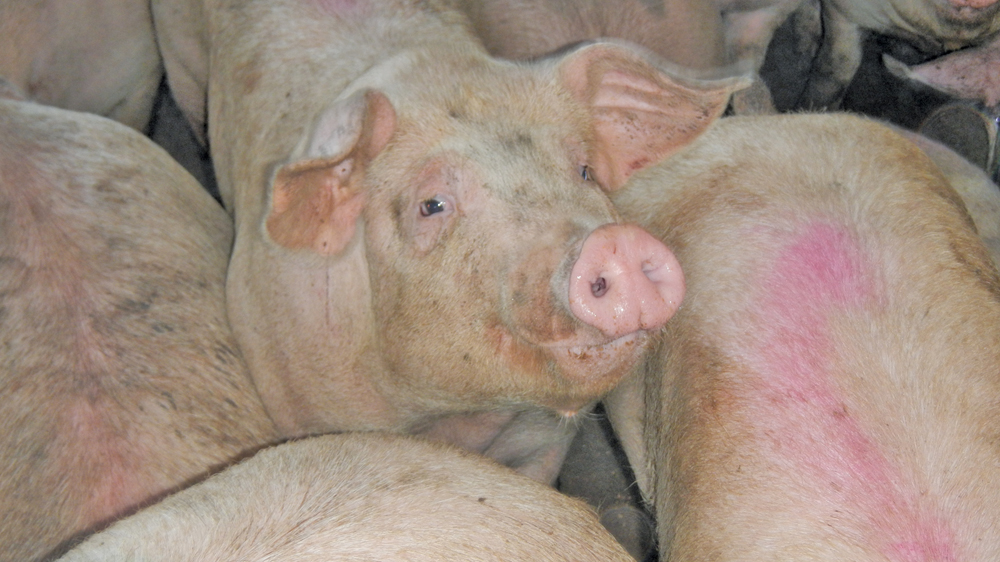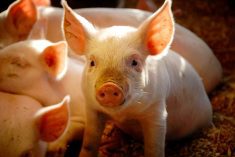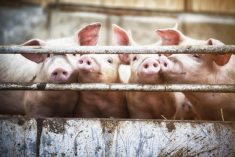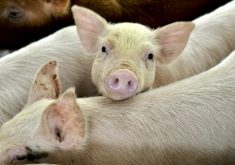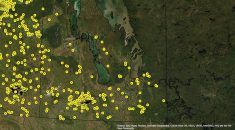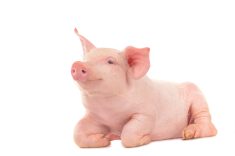Eight cases of porcine epidemic diarrhea (PED) have been confirmed in Manitoba in the last month, making this the worst year on record for the virus.
Last year, five cases of the disease were reported.
Two of the eight cases were found 20 kilometres away from the initial infection area, whereas the initial cases were reported very close to each other. All reported cases are in southeast Manitoba.
The Manitoba Pork Council has said the finisher barn most recently confirmed positive for PED received animals from an infected sow operation. The investigation into infections this year is ongoing.

“Four of the cases, they’re in the same management group,” Manitoba Pork Council general manager Andrew Dickson said. “They’re separate barns, but it’s run by the same company and so the question is, did something happen in that company and then it spread to the four barns? We’re not sure. Two of the barns are separate operations — nothing to do with those four. Somehow they got it and this new one, we’re not exactly sure how the sow barn got it, but it spread to the other barn.”
- Read more: PED cases fan out in southeastern Manitoba
- Read more: Path of Manitoba PED infections tough to track
Read Also

AgriStability enrolment deadline extended
The deadline for Manitoba farmers to enroll in the AgriStability business risk management program has been extended by three months agriculture minister Ron Kostyshyn announced on Friday.
PED causes severe dehydration and has been known to cause 80 to 100 per cent death losses of suckling pigs. Herd losses this year are unknown at this time.
Initial reports of the disease came this year after symptoms were noticed in a sow barn May 2. Another two reports quickly followed, bringing PED cases up to three by May 8. Another two cases were reported a week later, with both a feeder and sow barn testing positive May 16 and May 18. On May 25, another finisher barn was confirmed infected, followed shortly by two PED confirmations May 26.
Most recent cases bring Manitoba’s PED record to 18 since the virus was found in the province in 2014.
Dickson says he does not expect barns infected this year to be officially cleared of the disease for several months.
“This isn’t like a flu where you get better and ‘poof,’ you’re all done and then you go about your daily life. It’s not like that at all,” he said. “These barns retain the virus. It’s inside the barn. It takes a lot of work and effort to try and clean it out of the barn.”
Both the pork council and Manitoba’s chief veterinary officer have called for tighter biosecurity on farms in the area. Veterinarians within five kilometres of an infected farm, or with clients within that area, have been informed of PED-positive locations. All farms in the area have been strongly advised to limit traffic, move parking off site, move garbage and deadstock pickups off site, as well as other biosecurity measures.
Signed waivers allowing veterinarians to share information between each other to stem the virus’s spread are also strongly encouraged.
“It’s important that all the veterinarians in the province know what this disease is because you get a barn in southeast Manitoba supplying baby pigs to a barn in western Manitoba. The vets need to know what’s going on,” Dickson said following the May 16 PED confirmation. “When a person deals with the provincial government, your information is protected, so the province can’t divulge that information to a veterinarian who doesn’t have a direct business relationship with (an) operation.”
Dickson expects older animals to be shipped to the United States once cleared of symptoms while gilt shipments have stopped in infected sow operations until symptoms have cleared.
“In the meantime, of course, they’re cleaning the barn down to get rid of all the viral matter in the barn,” he said.






